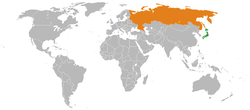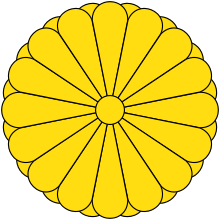Japan–Russia relations
 |
|
Japan |
Russia |
|---|---|
Relations between Russia and Japan (Russian: Российско-японские отношения) are a continuation of Japan–Soviet Union relations covering 1917-1991, and Empire of Japan–Russian Empire relations, covering 1855-1917. The two countries have been unable to sign a peace treaty after World War II due to the Kuril Islands dispute. As of 2016 matters remain unresolved,[1] and these disputes have effectively soured relations between the two countries. According to a 2012 Pew Global Attitudes Project survey, 72% of Japanese people view Russia unfavorably, compared with 22% who viewed it favorably, making Japan the country with the most anti-Russian sentiment surveyed.[2]
History
Relations before 1991
Russian Federation
The government of Boris Yeltsin took power in Russia in late 1991 upon the dissolution of the Soviet Union. At once, Moscow took a stand in opposition to relinquishing the disputed territories to Japan. Although Japan joined with the Group of Seven industrialized nations in contributing some technical and financial assistance to Russia, relations between Tokyo and Moscow remained poor. In September 1992, Russian president Boris Yeltsin postponed a scheduled visit to Japan. The visit took place on October 11, 1993. He made no further concessions on the Kuril Islands dispute over the four Kuril Islands (northeast of Hokkaido), a considerable obstacle to Japanese-Russian relations, but did agree to abide by the 1956 Soviet pledge to return two areas (Shikotan and the Habomai Islands) to Japan. Yeltsin also apologized repeatedly for Soviet mistreatment of Japanese prisoners of war after World War II. In March 1994, then Japanese minister of foreign affairs Hata Tsutomu visited Moscow and met with Russian minister of foreign affairs Andrei Kozyrev and other senior officials. The two sides agreed to seek a resolution over the persistent Kuril Islands dispute, but the decision of the dispute is not expected in the near future. Despite the territorial dispute, Hata offered some financial support to Russian market-oriented economic reforms. On July 30, 1998, the newly elected Japanese prime minister Keizō Obuchi had focused on major issues: signing a peace treaty with Russia, and renewing the Japanese economy. However, he died soon afterwards.
2010s
In March 2014, following Russia's annexation of Crimea, Japan imposed several sanctions against Russia, which included halting consultations on easing the visa regulations between the two countries and suspension of talks on investment cooperation, joint space exploration and prevention of dangerous military activity.[3][4]
Kuril Islands dispute

.jpg)
On August 16, 2006, Russian maritime authorities killed a Japanese fisherman and captured a crab fishing boat in the waters around the disputed Kuril Islands. The Russian foreign ministry has claimed that the death was caused by a "stray bullet".[5]
On September 28, 2006, Russian Foreign Minister Sergei Lavrov said Russia would "continue the dialogue with the new Japanese government. We will build our relations, how the peoples of the two countries want them to be. Then-Foreign Minister Taro Aso remained on his post in the government. We have good, long-standing relations, we will act under the elaborated program."[6]
The dispute over the Southern Kuril Islands deteriorated Russo-Japan relations when the Japanese government published a new guideline for school textbooks on July 16, 2008 to teach Japanese children that their country has sovereignty over the Kuril Islands. The Russian public was generally outraged by the action and demanded the government to counteract. The Foreign Minister of Russia announced on July 18, 2008 "[these actions] contribute neither to the development of positive cooperation between the two countries, nor to the settlement of the dispute," and reaffirmed its sovereignty over the islands.[7][8]
In 2010, President of Russia Dmitry Medvedev became the first Russian president to take a state trip to the Kuril Islands. Medvedev shortly ordered significant reinforcements to the Russian defences on the Kuril Islands. Medvedev was replaced by Vladimir Putin in 2012.
In November 2013, Japan held its first ever diplomatic talks with the Russian Federation, and the first with Moscow since the year 1973.[9] Further talks are expected in 2014, with a formal peace treaty on the table. Foreign Affairs has reported that both sides seem willing to compromise.[10]
See also
- Russians in Japan
- Japanese people in Russia
- Empire of Japan–Russian Empire relations
- Japan–Soviet Union relations
References
- ↑ Mochizuki, Takashi (2013-04-26). "Japan Seeks Closer Russia Ties - WSJ". Online.wsj.com. Retrieved 2016-10-22.
- ↑ "Opinion of Russia". Pew Research Center. 2012. Retrieved 12 August 2013.
- ↑ "TASS: Russia - Japan halts consultations on easing visa regime with Russia". En.itar-tass.com. Retrieved 2016-10-22.
- ↑ "Japan breaks several Ties with Russia over Crimea crisis". IANS. News.biharprabha.com. Retrieved 19 March 2014.
- ↑ Justin McCurry. "Japanese fisherman killed in Kuril dispute | World news". The Guardian. Retrieved 2016-10-22.
- ↑ "Archived copy". Archived from the original on 2007-03-11. Retrieved 2006-09-29.
- ↑ "Russia hopes to solve territorial dispute with Japan by strengthening trust_English_Xinhua". News.xinhuanet.com. 2008-07-19. Retrieved 2016-10-22.
- ↑ Japanese schoolbooks to claim Russia's Southern Kuril Islands, RussiaToday, Accessed 2008-07-19
- ↑ "First diplomatic talks between Japan, Russia result in strengthened security cooperation". The Japan Daily Press. 2013-11-04. Retrieved 2016-10-22.
- ↑ "Gang of Two". Foreign Affairs. 2013-11-27. Retrieved 2016-10-22.
- General
-
 This article incorporates public domain material from the Library of Congress Country Studies website http://lcweb2.loc.gov/frd/cs/. - Japan
This article incorporates public domain material from the Library of Congress Country Studies website http://lcweb2.loc.gov/frd/cs/. - Japan
Further reading
- Allison, Graham, Hiroshi Kimura and Konstantin Sarkisov, eds. Beyond Cold War to Trilateral Cooperation in the Asia-Pacific Region: Scenarios for new relationships between Japan, Russia, and the United States (Harvard University Press, 1993)
- Hara, Kimie. Japanese-Soviet/Russian Relations since 1945: A Difficult Peace (1998) online
External links
| Wikimedia Commons has media related to Relations of Japan and Russia. |
- Embassy of Japan in Moscow
- Consulate-General of Japan in Khabarovsk
- Consulate-General of Japan in Saint Petersburg
- Consulate-General of Japan in Vladivostok
- Consulate-General of Japan in Yuzhno-Sakhalinsk
- Embassy of the Russian Federation in Tokyo
- Consulate-General of the Russian Federation in Sapporo
- Database of Russian-Japanese relations



